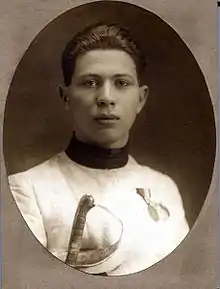 | |
| Personal information | |
|---|---|
| National team | |
| Born | 14 December 1904 Budapest, Austria-Hungary |
| Died | 30 January 1943 (aged 38) Davidovka, Ukraine |
| Sport | |
| Sport | fencing |
| Event | sabre |
Medal record | |
Attila Petschauer (14 December 1904 – 30 January 1943) was a Hungarian Olympic champion sabre fencer of Jewish heritage.[2]
Fencing career
Petschauer was born in Budapest, and was Jewish.[3][4][5]
He fenced first at a salle in Budapest opened in 1885 by Jewish maestro Károly Fodor (Mózes Freyberger) from the age of 8 to the age of 20, and then trained at Nemzeti Vivó Club (NVC) which was established by the Zionist lawyer Marcell Hajdu.[6] He won four Hungarian National Youth Championships.[6]
He was a member of the Hungarian fencing team in the 1928 and 1932 Olympics. Petschauer was regarded throughout the late 1920s and early 1930s as one of the world's top fencers.[7][8] Between 1925 and 1931, at the saber world championships he was three times a silver medalist and three times a bronze medalist.[9]
Olympic career
In Amsterdam in 1928 at the age of 23 he was part of the gold medal-winning Hungarian team in sabre, winning all 20 of his competition matches. In the individual sabre competition, Petschauer won the silver medal.[10][6]
In the 1932 Summer Olympics in Los Angeles, Petschauer was again part of the champion Hungarian sabre team.[6] The Hungarians won the gold medal in team sabre, and Petschauer finished 5th in individual sabre.[10]
Murder
Petschauer was arrested by the Nazis in 1943 and sent to a forced labor camp in Davidovka, Ukraine.[11][7][12][13]
Some claimed that Petschauer was tortured and murdered under orders of a Hungarian officer, a fellow former Hungarian Olympian named Kálmán Cseh, during his service in a Hungarian-Jewish Forced Labor Battalion.[14][12] A fellow inmate, Olympic champion wrestler Károly Kárpáti, recalled: “The guards shouted: ‘You, Olympic fencing medal winner . . . let’s see how you can climb trees.’ It was midwinter and bitter cold, but they ordered him to undress, then climb a tree. The amused guards ordered him to crow like a rooster, and sprayed him with water. Frozen from the water, he died shortly after.”[15][12][16][17]
A fictionalized account of his life and death were dramatised in the 1999 film Sunshine, starring Ralph Fiennes.[10][18]
Recent research by historians Csaba B. Stenge and Krisztián Ungváry show that according to the records of the Hungarian Royal Army, Petschauer died of typhus in a Soviet POW camp.[19]
Hall of Fame
He was inducted into the International Jewish Sports Hall of Fame in 1985.[14]
Memorial event
The Attila Petschauer Event was begun in 1995 as a memorial to Petschauer by his relative, Dr. Richard Markowitz.[16][20] It is known across the United States as one of the top sabre events.[21]
See also
References
- ↑ "Attila Petschauer Olympic Results". sports-reference.com. Archived from the original on April 17, 2020. Retrieved April 27, 2010.
- ↑ Paul Taylor (2004). Jews and the Olympic Games: The Clash Between Sport and Politics - With a ... ISBN 9781903900888. Retrieved January 23, 2013.
- ↑ The International Jewish Sports Hall of Fame - Joseph M. Siegman
- ↑ Day by Day in Jewish Sports History - Bob Wechsler
- ↑ Encyclopedia of Jews in Sports - Bernard Postal, Jesse Silver, Roy Silver
- 1 2 3 4 Jews in the Gym: Judaism, Sports, and Athletics
- 1 2 Masquerade: Dancing Around Death in Nazi-occupied Hungary - Tivadar Soros
- ↑ Jews and the Olympic Games: the clash between sport and politics: with a ... - Paul Taylor
- ↑ By the Sword: A History of Gladiators, Musketeers, Samurai, Swashbucklers ... - Richard Cohen
- 1 2 3 "Petschauer, Attila". Jews In Sports. Retrieved 11 March 2016.
- ↑ Not Just a Game - Doug Zipes
- 1 2 3 In the Darkroom - Susan Faludi
- ↑ "Olympians Who Were Killed or Missing in Action or Died as a Result of War". Sports Reference. Archived from the original on 17 April 2020. Retrieved 24 July 2018.
- 1 2 "Attila Petschauer". Jewishsports.net. Retrieved April 20, 2010.
- ↑ Lipman, Steve (August 8, 2008). "In Attila's Memory". New York Jewish Week. Archived from the original on June 16, 2011. Retrieved April 17, 2009.
- 1 2 Who Betrayed the Jews?: The Realities of Nazi Persecution in the Holocaust - Agnes Grunwald-Spier
- ↑ Jewish Jocks: An Unorthodox Hall of Fame
- ↑ London, Europe and the Olympic Games: European Perspectives
- ↑ https://www.academia.edu/35429986/Olimpiai_%C3%A9remszerz%C5%91k_trag%C3%A9di%C3%A1ja_a_Donn%C3%A1l_Petschauer_Attila_%C3%A9s_Sz%C3%A9kely_Andr%C3%A1s_mint_zsid%C3%B3_munkaszolg%C3%A1latosok_a_magyar_2._hadseregn%C3%A9l_Tragedy_of_Olympic_Medalists_at_the_River_Don_Attila_Petschauer_and_Zolt%C3%A1n_Sz%C3%A9kely_as_Jewish_Labour_Workers_at_the_Hungarian_2nd_Army_Seregszemle_2016_1.pp.108-114_ and https://index.hu/velemeny/olvir/2013/01/23/a_munkaszolgalat_embertelen_de_tulzo_mozgo_vesztohelynek_nevezni/
- ↑ "In Attila's Memory - Jewish Telegraphic Agency". Jewish Telegraphic Agency. 8 August 2008. Retrieved 6 July 2022.
- ↑ "fencingcenterli.com". fencingcenterli.com. Archived from the original on 2006-08-25. Retrieved April 20, 2010.